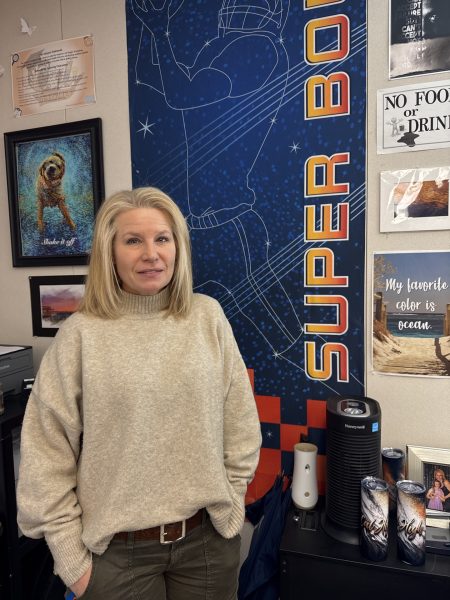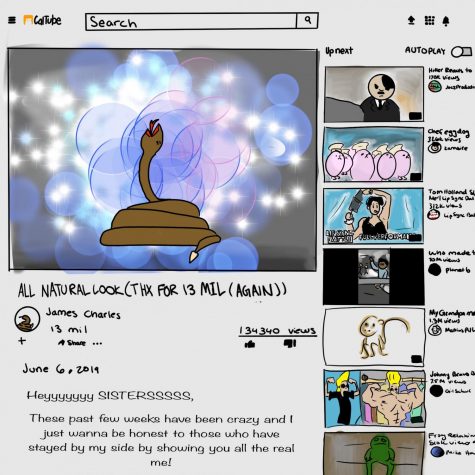School eliminates Adv. English 9, World Geo
Because the district is embracing an open access policy for all high school classes, Cal High has decided to eliminate Advanced English 9 and Advanced World Geography next year.
Advanced English 10 will continued to exist next year, but its future is uncertain beyond that.
Assistant Principal Crystal Lopez said the open access system already exists that allows students to take whatever classes they want for some subjects, such as AP classes.
But in the past, this was not the case for English and social science classes. Entrance to Advanced English 9 and 10 classes required students to take placement tests that determined their eligibility for the classes.
Students who passed the test for Advanced English 9 also qualified to take Advanced World Geography freshmen year.
English department curriculum leader Stacey Quick, who teaches Advanced English 10, said placement tests are being removed completely.
Only general freshman English will be offered next year. Many English teachers believe that Advanced English 10 will be removed after next school year.
First-year Superintendent Rick Schmitt discussed his philosophy for open access during a press conference with The Californian on March 21.
He explained that the idea came from his experience at Torrey Pines High School in San Diego. He described seeing hundreds of students lining up to meet their counselor so they could appeal to take the advanced classes that they wanted.
“Access to me was giving high school students complete autonomy over their schedules…no questions asked.” Schmitt said.
Schmitt has experience with other school districts where weighted classes were closed to students that were not considered “gifted,” as specified by a test taken in elementary school.
Schmitt said this idea conflicted with the College Board’s idea implemented since 2000 that schools and school districts should not bar students from taking the classes they wanted.
Open access has recieved a mixed reception because of the removal of the advanced freshmen classes.
Advanced World Geography teacher Ryan Cook said while he is sad to see his class go, he believes there is no real downside to the removal of these classes.
“I’m kind of bummed,” Cook said, “but at the same time I don’t think it’s a calamity.”
He went on to express that advanced classes don’t have serious weight on students’ GPAs and that nobody can truly be prepared for AP European History anyway.
But Advanced English 10 and Algebra 1 teacher Gilita Thomas believes that open access is moot without offering advanced english classes.
She said that by having courses with different levels of difficulty, students had more classes to choose from and could select the difficulty of the class they wanted to take.
“Now they have no choice,” Thomas said. “If you don’t have [the different classes], you don’t have a choice.”
But Quick said she believes the advanced classes weren’t necessary, citing Monte Vista and Dougherty Valley high schools as examples that don’t offer advanced English classes for freshmen and sophomores.
San Ramon Valley High is the only other district school that offers Advanced English 10. Cal was the only school to offer Advanced English 9.
Thomas wholeheartedly disagrees that the advanced classes aren’t necessary.
Thomas said while both Advanced English 9 and 10 courses are considered “college prep” classes, the term is very vague. She said that in reality Advanced English 9 and 10 do much more to prepare students for AP Language and Composition junior year.
Students such as sophomore Isha Pandya, who has taken advanced English the past two years, agreed that these classes were much more rigorous. She pointed out that compared to friends that took general English classes, she writes more essays and reads more books in her advanced classes.
Thomas is also concerned by the removal of the advanced English classes because many of her students said they felt they would be judged or belittled by their peers in general courses for participating actively in class. These students are often referred to as “teacher’s pets.”
Thomas said because of this concern, many of her students saw the advanced classes as a safe space within the regularly stressful school life. Without these classes some students may experience more stress.
Many students expressed that attempts to get rid of stress are simply in vain.
Junior Justin Lin has just gone an entire week of cramming for a science competition and sleeping at around 5 a.m. all while dealing with the homework load of five AP classes.
“It’s death,” Lin said jokingly, “I want to give up and not do anything and nap and be small.”
Lin is not alone. Many other students struggle with an unreasonable amount of AP classes, and with it, stress.
While Lin said he enjoys a challenge, he also said that Junior year in particular has been extremely challenging and stressful for him.
In his case, he took many AP classes because his friends did, so he felt an obligation to do the same.
“Basically, the whole group is committing suicide with five or six weighted classes,” Lin said.
Other Juniors like Zoe Zhang shared similar sentiments. She said an “AP Bubble” existed, where students were expected to take AP classes because their friends were.
And while Zhang personally expressed that AP classes were more comfortable than regular classes because of a tendency to know many others in the classes taking them with her, they are nonetheless stressful.
She explained that even if they don’t like the subject or don’t think they will do well they still take the class since it’s what they’re expected to do.
Lin proposed a very simple solution to stopping stress: get rid of the source. However, he also acknowledges that this is simply not a feasible solution for many.
He expressed that some people like himself are simply too stubborn to drop the class, while others simply trudged through as best as possible, and that some faced parental pressure.
Many juniors like Lin and Zhang said that much of their stress came from the fear of the inability to enter a good college.
Lin said that for him, “average” simply would not suffice to colleges because average is not good enough, and that now with his busy schedule load he no longer has time for his hobbies.
He said that there is immense pressure to get into a good school as his cousins have gotten into MIT, Harvard, Stanford, and UC Berkeley.
“You don’t really want to stand out by going to a college that’s less prestigious or something,” Lin said.
Lin acknowledges that the stressing over grades is absurd, but also feels that, while he’d like to say otherwise, there is no real solution to the stress problem at schools.
Even with that being said, Lin appreciates that such programs exist to help alleviate stress, even if he or his friends wouldn’t use them.
Open Access alone, as many juniors suggested, will not stop stress. The ability to remove the stress of being able to enter a class should contribute to the solution, but as both Lin and Zhang suggested, stress from college admissions is an entirely different beast to tackle with no clear solutions.








